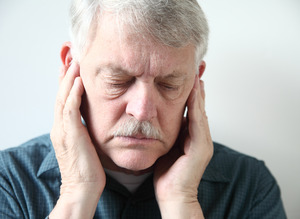
Having tinnitus means that there’s a ringing sound in your ears that only you can hear. This condition can have a number of possible causes, including hearing loss or an ear infection. However, many people don’t realize that in certain cases, tinnitus can actually be a side effect of a TMJ disorder. Here’s a look at how these two seemingly different problems may be linked more closely than you think.
What is a TMJ Disorder?
A TMJ disorder is an issue with one or both temporomandibular joints (TMJs) that connect your lower jaw to your skull. People with TMJ disorders often suffer from jaw pain, headaches, and earaches. They may also have trouble opening or closing their jaws. In many cases, TMJ disorder will grow worse over time if it’s not properly addressed.
How Can Tinnitus Be Linked to a TMJ Disorder?
The TMJ on either side of your head happens to be located very close to the inner ear. There’s one particular part of the inner ear known as the cochlea that plays an important part in hearing. When your TMJ is irritated or inflamed, it could put pressure on your inner ear and cause problems with the cochlea, resulting in tinnitus.
How Will You Know If Your Tinnitus Is Connected to a TMJ Disorder?
If the ringing in your ears seems to get worse after intense jaw activity (such as extensive chewing or speaking), it could be a side effect of a TMJ disorder. Additionally, there’s a good chance that you will notice additional TMJ-related symptoms. Of course, there are other potential explanations for tinnitus; it’s best to see a doctor so that they can help you narrow down the root cause.
What Can You Do About a TMJ Disorder That’s Causing Tinnitus?
Treating your TMJ disorder could potentially help relieve your tinnitus. Note that since TMJ disorder can have multiple causes, there’s more than one way that it can be treated. The solution that’s right for you depends on your unique situation.
For example, TMJ disorder is often related to bruxism, which is a condition where you unconsciously grind and clench your teeth. You can protect your jaw from the pressure of bruxism (thus giving your TMJ a chance to recover) by wearing a simple oral appliance known as an occlusal splint.
If you’re bothered by tinnitus and other symptoms related to a TMJ disorder, then it’s best to seek treatment from a professional as soon as possible. The sooner you act, the sooner you can start getting the most out of life again.
About the Author
Dr. Keane Fedosky belongs to the American Academy of Craniofacial Pain. At Sleep Rehab in Plano, he uses oral appliance therapy to help his patients find relief from TMJ disorders as well as sleep apnea. If you have concerns about TMJ disorder, you can schedule a consultation with Dr. Fedosky by visiting his website or calling (972) 753-3737.
